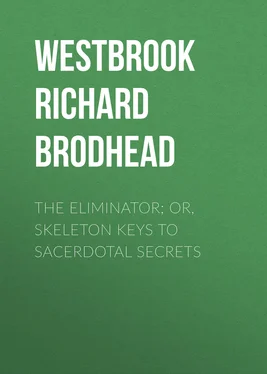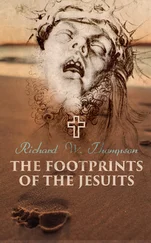Richard Westbrook - The Eliminator; or, Skeleton Keys to Sacerdotal Secrets
Здесь есть возможность читать онлайн «Richard Westbrook - The Eliminator; or, Skeleton Keys to Sacerdotal Secrets» — ознакомительный отрывок электронной книги совершенно бесплатно, а после прочтения отрывка купить полную версию. В некоторых случаях можно слушать аудио, скачать через торрент в формате fb2 и присутствует краткое содержание. Жанр: foreign_prose, foreign_religion, Философия, foreign_psychology, foreign_antique, на английском языке. Описание произведения, (предисловие) а так же отзывы посетителей доступны на портале библиотеки ЛибКат.
- Название:The Eliminator; or, Skeleton Keys to Sacerdotal Secrets
- Автор:
- Жанр:
- Год:неизвестен
- ISBN:нет данных
- Рейтинг книги:3 / 5. Голосов: 1
-
Избранное:Добавить в избранное
- Отзывы:
-
Ваша оценка:
- 60
- 1
- 2
- 3
- 4
- 5
The Eliminator; or, Skeleton Keys to Sacerdotal Secrets: краткое содержание, описание и аннотация
Предлагаем к чтению аннотацию, описание, краткое содержание или предисловие (зависит от того, что написал сам автор книги «The Eliminator; or, Skeleton Keys to Sacerdotal Secrets»). Если вы не нашли необходимую информацию о книге — напишите в комментариях, мы постараемся отыскать её.
The Eliminator; or, Skeleton Keys to Sacerdotal Secrets — читать онлайн ознакомительный отрывок
Ниже представлен текст книги, разбитый по страницам. Система сохранения места последней прочитанной страницы, позволяет с удобством читать онлайн бесплатно книгу «The Eliminator; or, Skeleton Keys to Sacerdotal Secrets», без необходимости каждый раз заново искать на чём Вы остановились. Поставьте закладку, и сможете в любой момент перейти на страницу, на которой закончили чтение.
Интервал:
Закладка:
Another reason why the whole truth cannot be expected from the regular clergy is, the influence of their pecuniary dependence upon those to whom they minister. The Jews have always been great borrowers and imitators. It was quite natural that they should adopt the “price-current list” of the ancient Phœnicians, whose priests not only exacted the tribute of “first-fruits,” but a fee in kind of each sacrifice. Then the judicial functions exercised by Jewish priests became a fruitful source of revenue, as the fines for certain offences were paid to the priests (2 Kings 12: 16; Hosea 4: 8; Amos 2: 8). According to 2 Sam. 8: 18 and 2 Bangs 10: 11, also 12: 2, the priests of the royal sanctuaries became the grandees of the realm, while the petty priests were generally poor enough—just as is well known to be the case among the Christian clergy of to-day, some receiving a salary of twenty-five thousand dollars and more per annum, while many of the “inferior clergy” hardly average two hundred and fifty dollars a year.
That the Christian clerical profession was borrowed from the Jews, just as the latter copied it from the heathen, is evident from the fact that Paul, while refusing for himself pecuniary support, preferring to “work with his own hands” (weaving tent-cloth), “living in his own hired house,” nevertheless defended the principle of ministerial support, mainly on the ground of the Mosaic law (Deut. 25: 4), “Thou shalt not muzzle the ox when he treadeth out the corn” (1 Cor. 9: 9; 1 Tim. 5: 18). It is a striking illustration of the inconsistency of the modern clergy that they quote, in reference to a salaried ministry, the words ascribed to Jesus (Matt. 10: 10), “The workman is worthy of his meat,” or, as it is rendered in Luke 10: 7, “The laborer is worthy of his hire,” very conveniently forgetting to quote the connecting words requiring them to “provide neither gold nor silver nor brass in their purse, nor scrip for their journey, neither two coats, neither shoes, nor yet staves,” but to enter unceremoniously into any house, accepting any proffered hospitality, “eating such things as might be set before them.” The fact is, the first disciples of Jesus, according to our Gospels, were mendicant monks, leading lives of asceticism and poverty. There is no evidence that one of them ever received a salary; they made themselves entirely dependent on public charity and hospitality. The idea of a “church living” or “beneficed clergy” or a salaried ministry never entered into the mind of Him of whom it is said he “had not where to lay his head.”
It is enough for the present argument to emphasize the point that, in the very nature of things, it is not reasonable to expect the whole truth from a salaried ministry. Those who have a large salary naturally desire to retain it; those who have small and insufficient salaries naturally desire to have them increased.
This can only be done by carefully preserving a good orthodox standing according to the sectarian shibboleth , and in pleasing the people who rent the pews or who dole out their penurious subscriptions for “the support of the gospel.” High-salaried ministers are most likely to be proud, arrogant, bigoted, sectarian. Starveling ministers become broken in spirit, fawning, and crouching, and they generally have an unconscious expression of appeal for help, of importunity and expectancy, stamped upon their faces. The millstone of pecuniary dependence hangs so heavily about their necks that they seldom hold up their heads like men, and they can never utter a new truth or a startling sentiment without pausing to consider what effect it may have on the bread and butter of a dependent and generally numerous family. Ministers with high salaries are almost sure to be spoiled, and those with low ones are sure to be stultified and dwarfed intellectually and morally; so that we cannot depend upon either class for the highest and latest truths. Those who have a “living,” provided in a State Church, and those who depend upon voluntary contributions from the people, are alike manacled and handicapped. We must look elsewhere than to the modern pulpit for that truth which alone can give freedom and true manliness. Perfect indifference as to ecclesiastical standing, backed by pecuniary independence, is an essential condition for untrammelled investigation and the fearless proclamation of the whole truth.
It was noticed in the recent convention of scientists in this city (the American Association) that it was the salaried professors in Church colleges who professed to find no conflict between Geology and Genesis. It will always be so until the ecclesiastical tyranny is greatly weakened or destroyed, and men can utter their boldest thoughts without fear or favor, and when teachers can afford to have a conscience by making themselves free from Church control and menial dependence upon those to whom they minister for the necessaries of a mere livelihood. Science itself has made progress only as it has been fearless of priestly maledictions; and when it shall throw off the incubus of Church patronage it will astonish the world in showing the eternal antagonisms between the dogmas of the dominant theology and the essential truths of natural religion and morality.
CONCLUSIONS.
The following conclusions follow from what has been said:
The clerical fraternity claims to be more than a mere profession. It is essentially a caste, a “holy order,” borrowed from the ancient paganism, but somewhat modified by Judaism and a perverted Christianity.
From such a caste or order the whole truth is not to be expected, especially when the truth would show the order to be an imposture. The assumptions of peculiar sanctity, official pre-eminence, functional prerogatives, and special spiritual authority make such a hope unnatural and quite impossible.
The church system, with its tests of orthodoxy, its ecclesiastical handcuffs, and its worse than physical thumb-screws, puts an end to all independent thinking, and results in an enforced conformity inconsistent with intellectual progress and the discovery and full publication of the whole truth.
The pecuniary stipend upon which professional preachers are dependent has a demoralizing and degrading influence, so that the doctrinal teaching of the pulpit should not be received without hesitation and distrust. The common law excludes the testimony of interested witnesses, and, though modern statutes admit such testimony, the courts take it for what it is worth, but always with many grains of allowance. “A gift perverteth judgment,” and self-interest may sway the convictions of a man who intends and desires to be fairly honest.
The existing systems of ministerial education and support deter many superior men from entering the profession, and have placed preaching upon a commercial or mercantile basis, which has manacled and crippled the pulpit, and must sooner or later result in the consideration of the question whether the services of the clergy are worth what they cost, and whether the truth must not be sought for in some other direction. More than two hundred and fifty thousand priests and ministers (of whom about one hundred thousand are in the United States) are maintained at an annual expense of more than five hundred millions of dollars; and, as a rule, where priests are most numerous, people are poorest and public morality lowest.
A member of the Canadian Parliament (Hon. James Beatty) has recently published a book in which he opposes the whole system of a salaried clergy on scriptural and other grounds; and many other thoughtful men are beginning to inquire how it is that the Society of Friends get along so well without a “hireling ministry.”
It is a great mistake to suppose that we must look mainly to professional clergymen for instruction in divine things. It is a significant fact that the most able and important books that have been published within the last decade have been written by laymen or by persons, like Emerson, who have outgrown the narrow garments of a caste profession and have laid them off. How to get along without professional ministers has been well answered by Capt. Robert C. Adams (quoted in the writer’s book, Man—Whence and Whither? pp. 218, 219).
Читать дальшеИнтервал:
Закладка:
Похожие книги на «The Eliminator; or, Skeleton Keys to Sacerdotal Secrets»
Представляем Вашему вниманию похожие книги на «The Eliminator; or, Skeleton Keys to Sacerdotal Secrets» списком для выбора. Мы отобрали схожую по названию и смыслу литературу в надежде предоставить читателям больше вариантов отыскать новые, интересные, ещё непрочитанные произведения.
Обсуждение, отзывы о книге «The Eliminator; or, Skeleton Keys to Sacerdotal Secrets» и просто собственные мнения читателей. Оставьте ваши комментарии, напишите, что Вы думаете о произведении, его смысле или главных героях. Укажите что конкретно понравилось, а что нет, и почему Вы так считаете.












